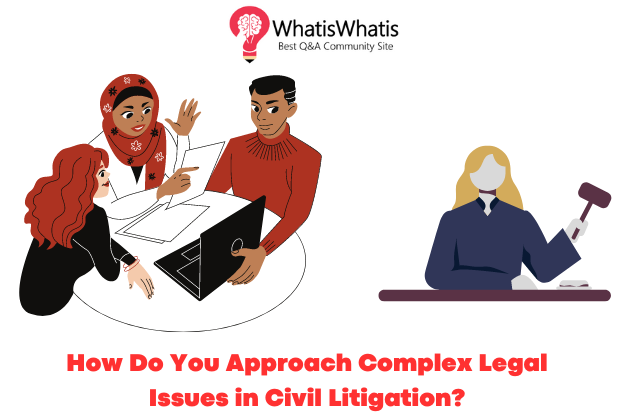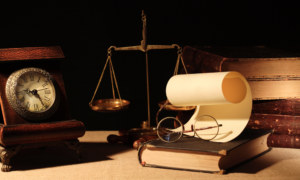Civil litigation encompasses all legal disputes where two private parties clash with the aim of either getting money or specifics on a contract. While there are some cases of a civil nature that are not complicated at all, some of the disputes might get very complicated.
Such heavy complex civil litigation cases most of the time feature huge financial stakes, conflicting interests of multiple parties and a range of complex legal issues which require the litigator to think analytically and creatively to develop and execute the best strategy.
This blogpost will put forth a thorough approach to the analysis of the complex legal system in civil litigations. We are going to examine the pre-trial phase first, which includes the case assessment and the case-building stage. Then, the detailed pre-trial procedures, trial preparation, and finally, the suitable post-trial options.
Throughout this, we will focus on the significance of well well-thought-out strategy and the critical contribution of experienced legal representation in the process of resolving educational fairness cases.
Know more: Things That Are Required To Get Class Value Added Services License
Initial Assessment and Case Building
The basis of complex civil litigation is laid during the initial assessment and case-building stage. In this, information is collected, and based on the client’s goals, a comprehensive strategy is formulated. Let’s understand the key steps involved in it:
Client Communication
In-depth interviews are conducted with the client to understand the genesis, timeline, and key events. Now, by collecting this information, the client’s goals are derived.
Following the client communication, document reviewing takes place. In this step, all relevant documents, such as contracts, emails, financial records, and industry regulations, are analyzed. This detailed review helps in identifying the potential claims, defences, and sources of evidence.
At last, a list of witnesses is prepared. These witnesses provide insights relevant to the case. So, that was all about fact-gathering and the client communication stage.
Legal Research and Strategy Development
During this stage, applicable laws and precedents governing the dispute are researched and understood. Analyze the relevant case; this will help you understand how courts have dealt with similar situations previously.
Be aware of the potential legal challenges and roadblocks that may arise. It’s a proactive way to develop strong counter-arguments and contingencies.
You need to make a unique strategy according to the case. Consider the need for both trial and alternative dispute resolution (ADR) options such as mediation or arbitration.
Additional Factors to Consider
- Evaluate the possible costs of litigation, including the legal fees, the expert witness fees, and the e-discovery expenses. Weigh these expenses against the possible advantages of the mission being successful.
- Keep open channels of communication with the client regarding the intricacies of the matter, the possible risks and rewards, and the estimated timeframe for a resolution.
- Pull together a team of legal counsellors who are knowledgeable in the right areas of law and have previous experience with complex civil litigation. These specialists may include e-discovery experts, witness management experts, and trial preparation experts.
Pre-Trial Phase
This stage consists of intense activity as it includes a collection of evidence, talking to a client about their needs, and reducing the scope of the dispute. It’s a very crucial stage as the entire case is dependent on it. Here are some components of this phase:
Pleading and Motions Practice
At first, a clear, short, and well-organized complaint is prepared. It outlines the legal claims, factual biases, and desired remedies of the client.
Then, the person who is being sued says something in response, and the opponent side needs to reply in a way that deals with what they said. They should talk about the reasons why the other person said those things and also point out if there are any mistakes or things that don’t make sense in what they said.
You should use the motions strategically to address the procedural issues and gather evidence. Doing so, you can potentially dispose of the case even before the trial. Common motions in complex litigation include motions to compel discovery, motions to dismiss specific claims, or summary judgment motions that argue there are no genuine issues of material fact for trial.
During the out-of-court sworn testimony of witnesses under oath, lawyers can question the opposing party’s witnesses and assess their credibility.
Discovery
During the stage of discovery, extensive exchange of information between the parties takes place. It uncovers the relevant evidence and assesses the case strength of each party. The key aspect of discovery in complex litigation is Interrogations, where written questions are submitted to the opposing parties, requiring detailed and verified answers under oath. Following this, formal requests for the opposite party are made to produce the relevant documents, recordings, or evidence.
One of the major steps is Electronic Discovery (e-Discovery). It involves finding, gathering, and showing electronically stored information like emails, databases, and text messages. It’s really important in complicated legal cases, but it can be a lot of work because there’s so much data to deal with.
Expert Witness
Expert witnesses become crucial in complex cases. Sometimes, specialized knowledge is required to explain the technical or scientific aspects relevant to the dispute.
A civil lawsuit lawyer may find qualified experts with relevant experience to support you in your legal claims or refute the opposition party’s arguments.
If your legal case is complex, there are chances you will need to work closely with the experts to develop clear, concise, and well-supported reports. You’ll have to prepare your experts for effective testimony. By conducting mock examinations and addressing potential areas of cross-examination from opposing parties, you can prepare your experts.
Post-Trial
The end of the trial is not always the end of a legal battle. The post-trial phase involves crucial steps to finalize the outcome. You have to address the court’s judgement and then look out for the other options if necessary.
Judgement and Appeal
Analyze the judgement to know about the final decision of the court. Mainly the judgement outlines the awarded damages, injunctive relief granted, and allocation of the court costs. You have to evaluate the possibility and process of appealing the judgment if it’s not in your client’s favour. You can do this by focusing on the errors and loopholes of law committed by the trial court judge. The decision to appeal involves a cost-benefit analysis, which could lead to a reversal.
Settlement Negotiations
You can opt for settlement negotiation anytime in between the entire litigation process, but these are often prone to getting intensified after the verdict of the trial. This is because the judgement provides clarity on the court’s position. This clarity is supposed to avoid the uncertainty of an appeal.
Appeals are a lengthy process. Moreover, they are expensive. It’s better for both sides to find a settlement to resolve the dispute.
Enforcement of Judgment
When court makes a decision and if money is involved, it’s likely to get awarded to the winning side. The court collect money from the offender and award it to the side who need it for compensation. It’s important to take the right steps to make sure the winning side gets what they’re owed and to learn from the case for future ones.
Privilege Issues in Complex Cases
Complicated lawsuits involve a lot of papers and communication, so maintaining a privilege becomes tough. However, attorney-client privilege and work product protection are a fundamental legal doctrine. It safeguards confidential communication between lawyers and their clients. But when your case involves extensive discovery, upholding these privileges can come with a lot of challenges to tackle you have to be strategic.
Here are cases when issues may arise:
Volume of Documents
The huge number of documents exchanged in the discovery of complex cases inevitably raises the risk of unintentionally disclosing privileged communications. This implies that a rigorous document review process must be put in place to isolate and separate privileged materials.
Multiple Parties and Communications
In such cases, the interests of multiple parties are intertwined, and this interrelationship generates a chain of communications. The lawyer-client confidentiality is not always easy to distinguish from other non-privileged communications with third parties.
Waiver of Privilege
There are certain actions, which can be done unintentionally and lose privilege protection. Such as, if a privileged communication is disclosed to a third party without any justification, all related communications will be waived.
Work Product Doctrine
The work product privilege shields materials prepared by lawyers while they are contemplating litigation. Nevertheless, the scope of work product protection is less extensive than attorney-client privilege. Knowing the details of the two doctrines is necessary for providing data confidentiality.
Do you know: What is Cyber Bullying
Conclusion
Lawyers need to understand the factual details of the case. They must gather strong evidence to support their arguments. Complex cases often involve a significant amount of electronic data that needs to be managed efficiently.
You may need a specialist to explain the technical aspect to the court, so never underestimate their role as it can impact the case to a greater extent. Try to settle the dispute before trial. If a settlement is not reached, prepare for trial. This is how a civil litigation lawyer may approach a complicated litigation process. However, the specific approach will vary depending on the nature of the case.





Leave a comment